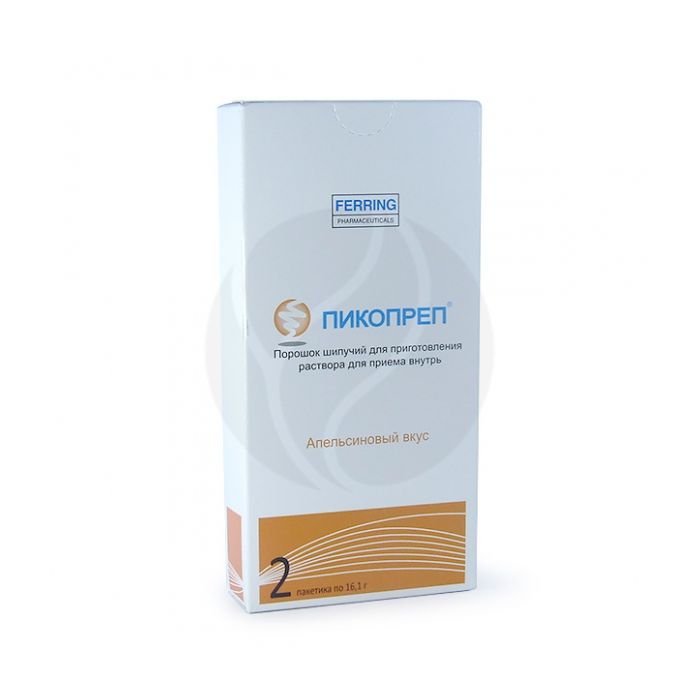Pikoprep powder, No. 2
Expiration Date: 11/2025
Russian Pharmacy name:
Пикопреп порошок, №2
Inside, one single dose is dissolved in 150 ml of water.
Effervescent powder for preparation of oral solution is white, crystalline, with a faint orange odor.
1 pack.
sodium picosulfate monohydrate 10 mg
citric acid anhydrous 12 g
magnesium oxide 3.5 g
Excipients: potassium bicarbonate 0.5 g, sodium saccharinate dihydrate 0.06 g, orange flavor 0.06 g.
Chronic heart failure;
dehydration;
weakness of gastric motility;
peptic ulcer and 12 duodenal ulcer;
toxic colitis;
toxic megacolon;
intestinal obstruction;
nausea and vomiting;
severe renal dysfunction;
rhabdomyolysis;
hypermagnesemia;
acute surgical abdominal conditions: acute appendicitis, diagnosed or suspected obstruction or perforation of the gastrointestinal tract, recent surgery on the gastrointestinal tract;
pregnancy (I trimester),
children up to age 9 years.
With caution Use with caution in patients with impaired renal function, heart disease, inflammatory bowel diseases, in patients taking drugs that affect the water-electrolyte balance (diuretics, corticosteroids, lithium preparations), in the elderly (65 years and older) and weakened patients during breastfeeding, during pregnancy (II and III trimesters), as well as in patients at risk of developing hypokalemia.
pharmachologic effect
Combined remedy.
Sodium picosulfate has a local laxative effect in the colon.
Magnesium citrate acts as an osmotic laxative by retaining water in the colon. Colon cleansing results from a powerful 'flushing' effect combined with stimulation of peristalsis.
Pharmacokinetics
All components have a local effect in the colon and are practically not absorbed.
Side effect
From the immune system: anaphylactic reactions, hypersensitivity.
From the side of metabolism: hyponatremia, hypokalemia.
From the nervous system: headache, epilepsy, a large seizure (without hyponatremia), convulsions, confusion.
From the gastrointestinal tract: nausea, proctalgia, vomiting, diarrhea, abdominal pain.
Skin and subcutaneous tissue disorders: rash (including erythematous and maculopapular), urticaria, pruritus, purpura.
Application during pregnancy and lactation
Not recommended for use in the first trimester of pregnancy. Reception during the II and III trimesters of pregnancy is possible only after a thorough assessment of the need and risks.
It is prescribed with caution during breastfeeding.
Application for impaired renal function
The use is contraindicated in severe renal impairment.
Application in children
The use is contraindicated in children under 9 years of age.
Use in elderly patients
With caution in the elderly (65 years and older) and debilitated patients.
special instructions
Not intended for use as a regular laxative.
In patients with signs of hyponatremia, it is necessary to take urgent measures to restore water and electrolyte balance.
Contains potassium bicarbonate, which should be taken into account in patients on a low-potassium diet.
In patients with a significant decrease in renal function, plasma magnesium may increase. Inadequate intake of water and electrolytes can cause a clinically significant deficiency of these components, especially in debilitated patients.
The preparation period for bowel cleansing should not exceed 24 hours; a longer period increases the risk of imbalance in water and electrolyte balance.
Influence on the ability to drive vehicles and mechanisms
Due to the possibility of side effects from the nervous system, care should be taken when driving vehicles and engaging in other potentially hazardous activities that require increased concentration of attention and speed of psychomotor reactions.
Drug interactions
This combination can affect the absorption of continuous oral medications (antiepileptic drugs, hypoglycemic drugs, oral contraceptives, antibiotics).
Concomitant use with diuretics, corticosteroids or cardiac glycosides increases the risk of hypokalemia.
Concomitant use with NSAIDs, as well as with drugs that can cause a syndrome of inappropriate antidiuretic hormone secretion or salt wasting syndrome (for example, tricyclic antidepressants, selective serotonin reuptake inhibitors, antipsychotics and carbamazepine) increases the risk of imbalance in water and electrolyte balance.

